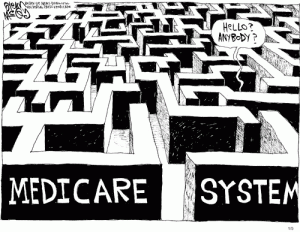Providing short-term care seems to be a great way to improve revenue and convert some of them to long term residents? Are you doing it? How is it working?
I bought my first copy of, “The 36-Hour Day” for my Mom when she took my grandmother into her home. That was well over 20 years ago. While aimed at families caring for loved ones with dementia, the book is a classic “field guide” for caring for the elderly in one’s home or in a senior living setting. Since then I have given several copies to friends caring for loved ones or working with seniors. The broadest recurring themes are, “take care of yourself”, “get help when you need it” and “this is not about martyrdom”. In other words, find ways to give yourself a break . . .“find and use respite care”. Good idea, but in truth figuring out how to do that in real life, finding practical situations is not so easy. It is particularly problematic if the caregiver needs to be away for a few days or weeks. Here are some of the challenges family members face:
- How do I find someone to come and stay with mom or dad?
- If I find someone can I trust them?
- Will mom or dad like them or at least tolerate them?
- What happens if that temporary care worker flakes out or has a problem of their own?
I recently got to talking with Blair Carey at Retirementhomes.com about how assisted living could be the perfect solution for these stressed out, overburdened home care givers. We got to wondering how many senior communities have a short-term care program, how active it is and how often those short-term stays turn into permanent stays. Here is why it seems to be a perfect fit for assisted living providers:
- An assisted living community already has all of the resources required to meet family concerns.
- Empty units are a perishable commodity, meaning when the day or week is over, the revenue potential is gone. It becomes a way to tap turn those empty units into cash flow.
- Some percentage of those short-term residents will find the experience to be so nifty they will turn into permanent residents.
- The more options you can offer your local marketplace, the more visibility you have.
Retirementhomes.com is particularly interested in working with senior communities who either have a short-term stay program in place or are interested in starting one. The Retirementhomes.com team is currently working on expanding their directory site to more easily allow assisted living communities that offer a short-term stay program with families who have that need. To further that goal, we are doing a survey that asks a few questions about short-term stay programs. As a modest enticement for completing this survey, we will be giving away three nifty Senior Housing Forum Coffee Mugs in a random drawing. Click here to take the survey










If you offer a assisted living facility, senior services, day-care, caregivers, senior center, or area agency, there are many different ways to draw in potential clients. Why not set up a Evening-Daycare or daycare-at-night program those with dementia. Alzheimer’s Day Care at Night blog provides a guide to establishing Evening-Daycare. http://alzdaycareatnight.wordpress.com
Promoting the establishment of new programs.
Carers often experience chronic sleep deprivation. At the onset of nighttime. The demons of anxiety, anger, fear, hallucinations and paranoia come out. Night time can be unpredictable, up and down cycles. A DCN provides a place where Alzheimer’s DayCare-at-Night programs offer activities to those who need supervised care. Those enrolled can enjoy daycare activities offered in evenings or over night
http://tinyurl.com/l8k4pj7
Most patients’ care is covered by Medicaid, which pays the Hebrew Home $140 a night, plus $74 for transportation to and from home.
I would be a consumer. I am on vacation right now and needed to put my mother into a SNF in order for me to take this vacation. It is very difficult to just put her into a facility where she doesn’t have a history or know anyone. Because she had to be in one for so long the past two years, I was able to put her in as a private pay. She is not medi Cal elegible. If they didn’t have a bed, when I was scheduled to go on vacation, I wouldn’t have been able to do it. As it is, even with her knowing the workers, I had her part time care giver come in for lunch and dinner so she wouldn’t be really mad at me when I pick her up tomorrow!
Christie,
How easy was it for you to place your parent in respite care? Did you have to look around to find an operator that would accept such an assignment or was it fairly easy?
How did operator manage with the medical and payment situations? Did they use their usual intake method or was there some truncated version?
I like the idea of having her existing part time caregiver as part of the equation as it shows to you and her that this was really a short term situation and applaud you for your efforts.
I believe there really is an opportunity and need for respite services; for all the reasons listed above and more. The challenge on the operations side always becomes about how to make it viable to the business and find economies. It needs to be efficient but that is where the conversation changes. Short stays are not efficient for the business. You’d need to charge a premium to handle the increase in administration, attention and service as well as any wear and tear that occurs through greater transition. That is assuming you are also setting up furnished enviironments and not have the logistics of personal belongs etc. So, there is a need but it not feasible that every can provide it, ket alone provide it with quality. Many do however accept and even promote their respite programs so certainly if you are in need of this, just ask around as not all are created equal.
Graham,
Our discussions with many COOs and CEOs is that there is the routine medical, financial and administrative matters need to be worked out in advance of the respite stay.
What do you think an individual operator needs help with first so as to facilitate more short term or respite care in their community?
I’m curious to see the results of the survey.
I’ve thought about doing respite, but we’d end up doing the same amount of paperwork etc as a full admit.
Is anyone finding it to be a decent revenue source, or just more trouble than it’s worth?